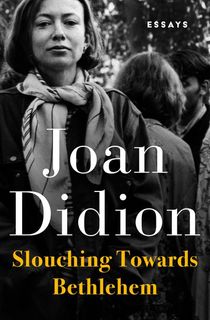
Slouching Towards Bethlehem
In twenty razor-sharp essays that redefined the art of journalism, National Book Award–winning author Joan Didion reports on a society gripped by a deep generational divide, from the “misplaced children” dropping acid in San Francisco’s Haight-Ashbury district to Hollywood legend John Wayne filming his first picture after a bout with cancer. She paints indelible portraits of reclusive billionaire Howard Hughes and folk singer Joan Baez, “a personality before she was entirely a person,” and takes readers on eye-opening journeys to Death Valley, Hawaii, and Las Vegas, “the most extreme and allegorical of American settlements.”
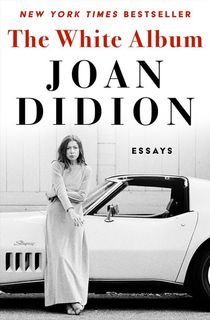
The White Album
From a jailhouse visit to Black Panther Party cofounder Huey Newton to witnessing First Lady of California Nancy Reagan pretend to pick flowers for the benefit of news cameras, Didion captures the paranoia and absurdity of the era with her signature blend of irony and insight. She takes readers to the “giddily splendid” Getty Museum in Los Angeles, the cool mountains of Bogotá, and the Jordanian Desert, where Bishop James Pike went to walk in Jesus’s footsteps—and died not far from his rented Ford Cortina. In the iconic title essay, she documents her uneasy state of mind during the years leading up to and following the Manson murders—a terrifying crime that, in her memory, surprised no one.
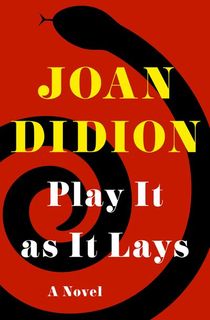
Play It as It Lays
Raised in the ghost town of Silver Wells, Nevada, Maria Wyeth is an ex-model and the star of two films directed by her estranged husband, Carter Lang. But in the spiritual desert of 1960s Los Angeles, Maria has lost the plot of her own life. Her daughter, Kate, was born with an “aberrant chemical in her brain.” Her long-troubled marriage has slipped beyond repair, and her disastrous love affairs and strained friendships provide little comfort. Her only escape is to get in her car and drive the freeway—in the fast lane with the radio turned up high—until it runs out “somewhere no place at all where the flawless burning concrete just stopped.” But every ride to nowhere, every sleepless night numbed by pills and booze and sex, makes it harder for Maria to find the meaning in another day.
A “scathing novel” of one woman’s path of self-destruction in 1960s Hollywood (The Washington Post Book World).
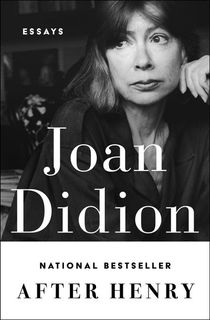
After Henry
Once again, Joan Didion proves that she is one of the premier essayists of the twentieth century, “an articulate witness to the most stubborn and intractable truths of our time” (Joyce Carol Oates, The New York Times Book Review). Highlights include “In the Realm of the Fisher King,” a portrait of the White House under the stewardship of Ronald and Nancy Reagan, two “actors on location;” and “Girl of the Golden West,” a meditation on the Patty Hearst case that draws an unexpected and insightful parallel between the kidnapped heiress and the emigrants who settled California.
Dedicated to Henry Robbins, Didion’s friend and editor from 1966 until his death in 1979, After Henry is an indispensable collection of “superior reporting and criticism” from a writer on whom we have relied for more than fifty years “to get the story straight” (Los Angeles Times).
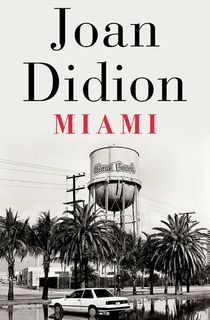
Miami
From Fidel Castro and the Bay of Pigs invasion to Lee Harvey Oswald and the Kennedy assassination to Oliver North and the Iran–Contra affair, Joan Didion uncovers political intrigues and shadowy underworld connections, and documents the US government’s “seduction and betrayal” of the Cuban exile community in Dade County. She writes of hotels that offer “guerrilla discounts,” gun shops that advertise Father’s Day deals, and a real-estate market where “Unusual Security and Ready Access to the Ocean” are perks for wealthy homeowners looking to make a quick escape.
With a booming drug trade, staggering racial and class inequities, and skyrocketing murder rates, Miami in the 1980s felt more like a Third World capital than a modern American city. Didion describes the violence, passion, and paranoia of these troubled times in arresting detail and “beautifully evocative prose” (The New York Times Book Review).
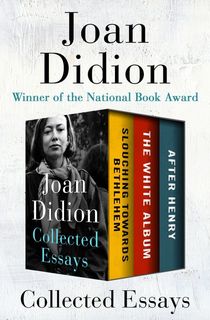
Collected Essays
Three essential works that redefined the art of journalism by “one of our sharpest and most trustworthy cultural observers” (The New York Times).
Slouching Towards Bethlehem: America in the 1960s—a pivotal era of social change and generational divide. Named to Time magazine’s list of the one hundred best and most influential nonfiction books, this is “a rare display of some of the best prose written today in this country” (The New York Times Book Review).
The White Album: A New York Times bestseller, this landmark essay collection confronts the dark aftermath of the 1960s.
After Henry: Whether reporting on a Hollywood murder or the “sideshows” of foreign wars, Joan Didion crystalizes her reputation as a brilliant essayist. An indispensable collection from a writer on whom we can rely “to get the story straight” (Los Angeles Times).
